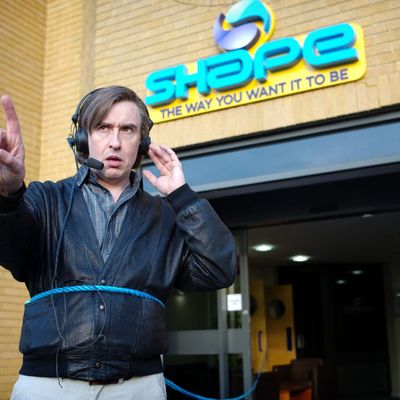
It was more than two decades ago that Steve Coogan’s Alan Partridge first appeared, on the BBC radio comedy show On the Hour. Created largely by Coogan and Armando Iannucci (In the Loop, Veep) as a satirical take on preening, motormouth broadcasters, Partridge has taken on a life of his own, appearing in a variety of radio programs, TV shows, and webisodes over the past two decades in Britain. He’s a brilliant creation: a single-minded narcissist and deeply insecure reactionary whose job is literally to fill dead air, and who often fills it with inane drivel. You watch him with an equal mixture of glee and cringing embarrassment. He’s a key step in the rise of humiliation comedy — the crucial link between Basil Fawlty of Fawlty Towers and David Brent/Michael Scott of The Office.
As such, though, Partridge is also a character best digested in small doses. Can he carry a movie? Directed by Declan Lowney and working from a script written by Coogan, Iannucci, and several other collaborators, Alan Partridge awkwardly tries to wed the episodic spirit of the character with the feature-length demands of a theatrical experience. The result is a mess, but it’s got some choice bits. Even if you forget the film itself, you might find yourself quoting parts of it for years.
As the movie opens, Alan is now a mid-morning DJ in Norfolk, droning on with the kind of pointless chatter that is his métier. (“Which is the worst monger? Iron, fish … rumor, or war?”) But his radio station has just been bought by a soulless media conglomerate, and nighttime DJ Pat (Colm Meaney) is convinced that the new owners are going to gut the staff. Ever the yes man, Alan himself has blithely bought into all the corporate bullshit, including the ridiculous changing of the station’s name to “Shape.” (“It’s quite simple. Gordale Media are simply reimaging our core brand values and giving it a name more fitting to multi-platform content delivery. They’re people people.” “People people sack people.” “No, Pat, people sack people. People people please people. You know that.”)
Regardless, Alan can’t say no to an opportunity to play the hero, so at his colleagues’ request, he bravely interrupts a board meeting, mainly to make a case for keeping Pat on the job. But before the meeting is through, in the movie’s funniest scene, Alan has convinced the executives to sack his fellow DJ. When he’s fired, Pat goes off the deep end and takes the radio station hostage with a shotgun. The cops then enlist Alan, whose duplicity is still unknown to his co-workers, to act as an intermediary. Hilarity and humiliation ensue. Sort of.
It’s easy to see how that hostage siege plotline is meant to raise the stakes in a way that will carry us along for 90 or so minutes, but in reality, it has the opposite effect. The charm of Alan Partridge is not in story, but in interaction, in the rat-tat-tat of nonsense that comes out of Alan’s mouth and others’. So, the film never quite leaves its skit-based origins behind. As Alan tries to negotiate with Pat, he does such things as host a radio show with him at gunpoint, devise and record a new jingle with his fellow hostages, and attempt to break back in to the station after locking himself out. It’s funny stuff, to be sure, but don’t be surprised if you find yourself checking the time whenever the actual plot kicks in. Still, in an age when everything is meant to wind up as viral fragments, cut up and shared across multiple platforms just the way Alan’s new corporate bosses have intended, Alan Partridge the movie might have the last laugh. It’s being released into a world where its failure to cohere might turn out to be its greatest asset.





